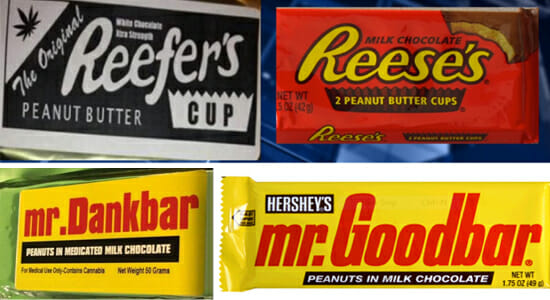We talk a lot on this blog about branding challenges and limitations unique to marijuana businesses. For some of our previous posts on this topic, check out the following:
- Organic Marijuana: Not Exactly
- Mirth Provisions Hits it Big with Branding Cold Brew Coffee
- Protect Your Cannabis Brand with a Trademark
- Cannabis Branding. Because it is Important.
One additional branding issue that we’ve seen cropping up for some time now is parody. What do we mean when we talk about parody? In the legal context, parody is a type of speech protected by the First Amendment as a “distorted imitation” of an original work for the purpose of commenting on it. Parody can be asserted as a defense to trademark infringement.
However, asserting a parody defense in a commercial setting, and particularly in the context of the marijuana industry, can be difficult. There is a line between using another’s mark to make political or social commentary, and using another’s mark to gain recognition and increase sales for your own product. Some cannabis companies have attempted to spoof well known marks and have paid a price for having done so. Hershey’s, for example, initiated multiple lawsuits against companies that branded cannabis-infused chocolate products with names such as “Mr. Dankbar,” “Reefer’s Peanut Butter Cups,” “Hasheath,” and “Ganja Joy,” all meant to imitate their non-cannabis Hershey’s counterpart.
 The problem with these types of “parodies” is two-fold. The first concern is over likelihood of confusion, and the second pertains to dilution or tarnishment. If there is sufficient similarity between the parody and the original mark, the court will find infringement based on a likelihood of confusion. This essentially means that the marks are similar enough to cause consumer confusion as to the source of the product, and big brands do not want your cannabis company using the success of their trademarks to market your own products.
The problem with these types of “parodies” is two-fold. The first concern is over likelihood of confusion, and the second pertains to dilution or tarnishment. If there is sufficient similarity between the parody and the original mark, the court will find infringement based on a likelihood of confusion. This essentially means that the marks are similar enough to cause consumer confusion as to the source of the product, and big brands do not want your cannabis company using the success of their trademarks to market your own products.
The second issue, dilution or tarnishment, is typically a fairly weak means of attacking a trademark parody. However, because of the federally illegal status of marijuana, and the perceived “scandalous” nature of illegal drugs, arguing that a cannabis-infused version of a popular product “tarnishes” a famous brand is not a stretch. Hershey’s does not want consumers thinking of “Reefer’s Peanut Butter Cups” every time they buy Reese’s products — at least not yet, they don’t.
There are a few takeaways here. First, a First Amendment argument is always easier to make in a non-commercial context, where a parody of a mark is not used in connection with any goods or services. This makes for a much stronger argument that the parody is only meant to express an idea, and not to generate profit based on brand recognition. Second, the degree of similarity between a “parody” and the original mark makes a big difference. The more similar the marks, the more likely it is that the court will find infringement based on likelihood of confusion. Third, tarnishment is a much bigger issue in the context of marijuana branding than in most other industries, and may be an easy way for established companies to attack infringing marks. And finally, even if you think you have a strong argument for defending your mark on the basis of parody or First Amendment grounds, the cost of litigating with corporations like Hershey’s could very well put you out of business, even on the off chance that you prevail. Having already defended some of these cases, we can tell you it is just not worth the risk. Trust us when we tell you to stay away from using other company’s branding, even if you think you are doing so as some sort of parody.























